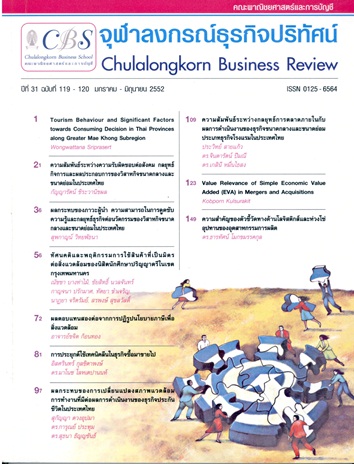ผลตอบแทนสองต่อจากการปฏิรูปนโยบายภาษีเพื่อสิ่งแวดล้อม
Main Article Content
Abstract
บทคัดย่อ
จากปัญหาด้านสิ่งแวดล้อมในปัจจุบัน หลายประเทศหันมาให้ความสนใจกับการจัดหามาตรการที่จะร่วมกันกำกับดูแลเพื่อบรรเทาปัญหาการทำลายสิ่งแวดล้อม ภาษีสิ่งแวดล้อมเป็นเครื่องมือทางเศรษฐศาสตร์รูปแบบหนึ่งที่ได้รับความสนใจที่จะนำมาใช้แก้ไขปัญหานี้เป็นอย่างมาก วัตถุประสงค์หลักของการเรียกเก็บภาษีสิ่งแวดล้อม คือการเรียกเก็บค่าใช้จ่ายในการรักษาและฟื้นฟูสิ่งแวดล้อมจากบุคคลที่มีส่วนเกี่ยวข้องในการทำลายสิ่งแวดล้อม เช่น ภาษีที่เรียกเก็บจากกิจกรรมที่มีการปล่อยก๊าซคาร์บอนไดออกไซด์ ภาษีที่เรียกเก็บเพื่อใช้เป็นค่าใช้จ่ายในการทำลายขยะ เป็นต้น ภาษีสิ่งแวดล้อมเหล่านี้จะถูกรวมเข้ากับต้นทุนของผลิตภัณฑ์และบริการ เพื่อเป็นแรงจูงใจให้ทั้งผู้ผลิตและผู้บริโภคปรับเปลี่ยนพฤติกรรมการทำลายสิ่งแวดล้อมได้ นอกจากนี้แล้วหลายประเทศในกลุ่มสหภาพยุโรป ได้มีการปฏิรูปนโยบายภาษีของประเทศตนเอง เพื่อนำรายได้จากภาษีสิ่งแวดล้อมไปชดเชยการเก็บภาษีเงินได้บุคคลธรรมดา และเงินประกันสังคม ทำให้แรงงานมีรายได้เพิ่มขึ้น มีสวัสดิภาพชีวิตที่ดีขึ้น และมีอัตราการจ้างงานสูงขึ้นอีกด้วย
Abstract
It has been widely accepted that an environmental destruction is considered to be one of the most emergent issues which several countries considerably concern and attempt to come up with a solution. Having recently been acknowledged to be an economic device for solving this sort of problem, green tax is the fee levying from any kind of activities concerning environmental aggravation such as CO2 release and disposal of waste. To influence people to change their consuming behaviors and create their environmental awareness, this tax will be included as one category of product and service costs and both producers and consumers will be charged. Green tax also has an impact on the reformation of tax policy in many countries in EU, including using green tax revenue to compensate for income tax and social security payments to increase labor income, welfare, and employment rate.
Article Details
Opinions and discussions in papers published by the Creative Business and Sustainability Journal (CBSJ) are deemed as personal opinions and the responsibility of the writers. They are not the opinions or responsibility of the Chulalongkorn Business School of Chulalongkorn University.
Papers, content, information etc. appearing in the Journal are deemed to be the copyright property of the Chulalongkorn Business School of Chulalongkorn University. Anybody or any organization that wishes to publish any part of them or use them in any way must obtain written permission from the Chulalongkorn Business School, Chulalongkorn University.


